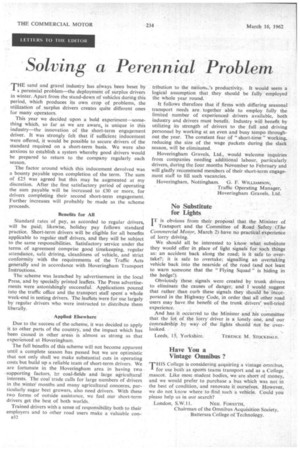Solving a Perennial Problem
Page 66

If you've noticed an error in this article please click here to report it so we can fix it.
THE sand and gravel industry has always been beset by
a perennial problem—the deployment of surplus drivers in winter. Apart from the stand-down of vehicles during this period, which produces its own crop of problems, the utilization of surplus drivers creates quite different ones for many operators.
This year we decided upon a bold experiment—something which, so far as we are aware, is unique in this industry—the innovation of the short-term engagement driver. It was strongly felt that if sufficient inducement were offered, it would be possible to secure drivers of the standard required on a short-term basis. We were also anxious to establish a system whereby good drivers would be prepared to return to the company regularly each season.
The factor around which this inducement devolved was a bounty payable upon completion of the term. The sum of £25 was agreed but this may be augmented at my discretion. After the first satisfactory period of operating the sum payable will be increased to £30 or more, for drivers completing their second short-term engagement. Further increases will probably be made as the scheme proceeds.
Benefits for All Standard rates of pay, as accorded to regular drivers, will be paid; likewise, holiday pay follows standard practice. Short-term drivers will be eligible for all benefits applicable to regular staff drivers, and they will be subject to the same responsibilities. Satisfactory service under the terms of agreement Comprise good timekeeping, regular attendance, safe driving, cleanliness of vehicle, and strict conformity with the requirements of the Traffic Acts generally and in accordance with Hoveringham Transport Instructions.
The scheme was launched by advertisement in the local Press, and by specially printed leaflets. The Press advertisements were astonishingly successful. Applications poured into the traffic office and the transport staff spent a whole week-end in testing drivers. The leaflets were for use largely by regular drivers who were instructed to distribute them liberally.
AppliedElsewhere
Due to the success of the scheme, it was decided to apply it to other parts of the country, and the impact which has been caused in other areas is almost as strong as that experienced at Hoveringham.
The full benefits of this scheme will not become apparent until a complete season has passed but we are optimistic that not only shall we make substantial cuts in operating costs but build up a reliable team of short-term drivers. We are fortunate in the Hoveringham area in having two supporting factors, he coal-fields and large agricultural interests_ The coal trade calls for large numbers of drivers in the winter months and many agricultural concerns, particularly sugar beet growers, also need drivers. With these two forms of outside assistance, we feel our short-term drivers get the best of both worlds.
Trained drivers with a sense of responsibility both to their employers and to other road users make a valuable cons32 tribution to the nation...A productivity. It would seem a logical assumption that, they should be fully employed the whole year round.
It follows therefore that if firms with differing seasonal transport needs are together able to employ fully the limited number of experienced drivers available, both industry and drivers must benefit. Industry will benefit by utilizing its strength of drivers to the full and driving personnel by working at an even and busy tempo throughout the year. The constant fear of "short-time" working, reducing the size of the wage packets during the slack season, will be eliminated.
Hoveringham Gravels, Ltd., would welcome inquiries from companies needing additional labour, particularly drivers, during the four months November to February and will gladly recommend members of their short-term engagement staff to fill such vacancies.
Hoveringham, Nottingham. .G. F. WILLIAMSON, Traffic Operating Manager, Hoveringham Gravels, Ltd.
No Substitute for Lights
IT is obvious from their proposal that the Minister of 1 Transport and the Committee of Road Safety (The Commercial Motor, March 2) have no practical experience of lorry driving.
We should all be interested to know what substitute they would offer in place of light signals for such things as: an accident back along the road; is it safe to overtake?; it is safe to overtake; signalling an overtaking vehicle back into the nearside of the road (and not least to warn someone that the "Flying Squad" is hiding in the hedge!).
Obviously these signals were created by trunk drivers to eliminate the causes of danger, and I would suggest that rather than curb these signals they should be incorporated in the Highway Code, in order that all other road users may have the benefit of the trunk drivers', well-tried experience.
And has it occurred to the Minister and 'his committee that the lot of the lorry driver is a lonely one and our comradeship by way of the lights should 'ncit be overlooked.
Leeds, 0, Yorkshire. TERENCE M. STOCKDALE.
Have You a Vintage Omnibus ?
THIS College is considering acquiring a vintage omnibus, 1 for use both as sports teams transport and as a College mascot. Like most student bodies, we are short of money, and we would prefer to purchase a bus which was not in the best of condition, and renovate it ourselves. However, we do not know where to find such a vehicle. Could you please help us in our search?
London, S.W.11. NEIL FORSYTH, Chairman of the Omnibus Acquisition Society, Battersea College of Technology.




















































































































